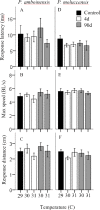Extended exposure to elevated temperature affects escape response behaviour in coral reef fishes
- PMID: 28828253
- PMCID: PMC5564382
- DOI: 10.7717/peerj.3652
Extended exposure to elevated temperature affects escape response behaviour in coral reef fishes
Abstract
The threat of predation, and the prey's response, are important drivers of community dynamics. Yet environmental temperature can have a significant effect on predation avoidance techniques such as fast-start performance observed in marine fishes. While it is known that temperature increases can influence performance and behaviour in the short-term, little is known about how species respond to extended exposure during development. We produced a startle response in two species of damselfish, the lemon damsel Pomacentrus moluccensis, and the Ambon damselfish Pomacentrus amboinensis, by the repeated use of a drop stimulus. We show that the length of thermal exposure of juveniles to elevated temperature significantly affects this escape responses. Short-term (4d) exposure to warmer temperature affected directionality and responsiveness for both species. After long-term (90d) exposure, only P. moluccensis showed beneficial plasticity, with directionality returning to control levels. Responsiveness also decreased in both species, possibly to compensate for higher temperatures. There was no effect of temperature or length of exposure on latency to react, maximum swimming speed, or escape distance suggesting that the physical ability to escape was maintained. Evidence suggests that elevated temperature may impact some fish species through its effect on the behavioural responses while under threat rather than having a direct influence on their physical ability to perform an effective escape response.
Keywords: Climate change; Coral reef fish; Fast-start response; Predator–prey; Temperature.
Conflict of interest statement
The authors declare there are no competing interests.
Figures


References
-
- Australian Institute of Marine Science Water temperature for Janurary 2014, Arlington and Moores reefs. AIMS, Townville [2014 Janurary];http://maps.aims.gov.au/index.html?intro=falsez=4ll=142.91883,-17.51872l... 2014
-
- Allen G. Damselfishes of the world. Mergus Publishers; Melle: 1991.
-
- Angilletta MJ. Thermal adaptation: a theoretical and emprirical synthesis. Oxford University Press; New York: 2009.
LinkOut - more resources
Full Text Sources
Other Literature Sources

